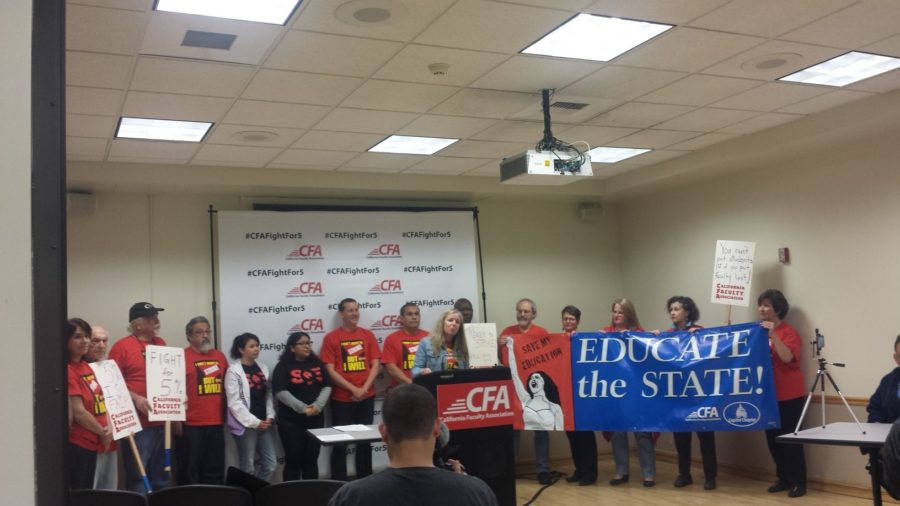CFA report goes public with recommendations
The California Faculty Association leadership speaking at a press conference in the University Union to announce the release of a third party fact finding panel’s recommendations about the pay dispute with the California State University Administration, Monday, March 28.
March 28, 2016
The California Faculty Association announced the recommendations of the third party fact finding panel in the pay dispute with the California State University administration this morning.
After a ten day media blackout, the CFA has released the following recommendations from the fact finding panel:
The first recommendation is to increase faculty compensation with a General Salary increase of 5 percent.
The second is to provide Service Step increases to the approximately 43 percent of faculty eligible.
The third recommendation is to continue to study the faculty salary issue; develop a list, agreeable to both sides, of comparable universities that award bachelor’s and master’s degrees; and do a comparison using available AAUP data including a cost-of-living comparison.
The fourth CFA recommendation is to develop a joint strategy and documentation to go to the California Legislature and the Governor to seek the needed state funding for the CSU budget.
Kevin Wehr, president of the Sacramento chapter of the CFA and a sociology professor at Sacramento State, said it is now legal for faculty to strike, and they plan to do so for five days in two weeks, from April 13 to 15, 18 and 19.
“We do recognize that a work stoppage on the part of faculty would be a disruption,” Wehr said. “Withholding our labor in a strike scenario is a major thing, but we were very careful to minimize the disruption to students while maximizing the disruption to management.”
Sac State President Robert Nelsen said the campus will remain open despite the strike, and he encouraged students to come to campus to participate in the many arts and sporting events taking place that week.
“The negotiations are not taking place on our campus … they’re taking place in Long Beach,” Nelsen said. “So that really is out of our hands. I’m very hopeful that there can be a solution.”
Nelsen said there would still be some classes taking place on campus the week of the strike. Students should check with their professors as to whether or not they will be having class during the strike.
“Our students’ education will not be harmed because of disagreements. There are too many good people at this university,” Nelsen said. “You’re in the classes, you know the faculty, you know how much they—I’m sorry, love you, but they really do, OK—and that love will win out.”
This article will be updated as new information becomes available.
A statement released today from the CSU’s Office of the Chancellor stated that the only way to get an additional $70 million for the pay increase would be to either divert funds from current projects, or to postpone those projects for two years and hope that the state would backfill those dollars. Both options, the statement said, are unworkable.
“Any attempt to pull back from these commitments would cause significant harm to students, faculty, staff and California,” CSU Chancellor Timothy White said. “As a fiscally responsible public entity, the CSU cannot commit to spend money it does not have.”
(Updated Monday, March 28 at 12:30 p.m.)
Elizabeth Chapin, interim manager of Public Affairs, responded to some claims made during the CFA’s announcement.
Chapin said it is false that the CSU administration never met with the CFA during the 10 day media blackout. CFA representatives Lillian Taiz, Jennifer Eagan, and Bob Muscatt met with CSU Chancellor Timothy White and CSU board members Lou Monville and Lillian Kimbell on Friday, March 25 at the Chancellor’s Office. The meeting lasted more than 10 hours, Chapin said.
Chapin also stated it was untrue that CSU faculty had not received a pay increase in the past 10 years.
“Faculty received raises the past two years as part of a multi-year funding plan,” Chapin said. “The CSU’s proposed two percent for 2015-16 is also part of that plan.”
(Updated Monday, March 28 at 1 p.m.)
































































































































